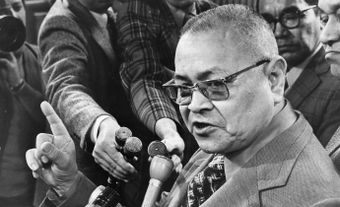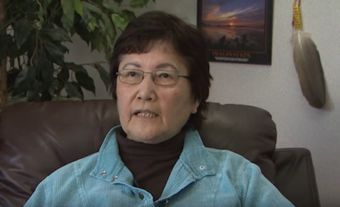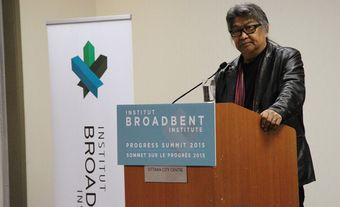Harold Cardinal, Cree chief, lawyer, author (born on 27 January 1945 in High Prairie, AB; died on 3 June 2005 in Edmonton, AB). An Indigenous rights activist, Cardinal was a leader in the movement against the 1969 White Paper, which sought to do away with Indian Status and treaty rights. Cardinal was actively involved in Indigenous politics for much of his life and is remembered as a strong and inspirational leader.

Early Life and Career
Harold Cardinal grew up on the Sucker Creek reserve, located about 22 km east of High Prairie, Alberta.
In 1968, he was elected president of the Indian Association of Alberta, its youngest president. During his nine terms in office (1968-77), Cardinal initiated many programs to affirm Indigenous culture and traditions. (See also Indigenous Political Organization and Activism in Canada.)
White Paper, 1969
In 1969, the federal government released the Statement of the Government of Canada on Indian Policy, otherwise known as the 1969 White Paper. It proposed the elimination of separate legal status for Indigenous people in Canada (i.e., Indian Status) and called for their assimilation into mainstream Canadian society. The White Paper also argued that the federal government should not negotiate treaties with Indigenous peoples because treaties could only be established and signed between sovereign nations.
Cardinal and the Indian Association of Alberta, along with other Indigenous leaders, such as John Snow and Adam Solway, rejected the White Paper and published Citizens Plus (1970), also known as the Red Paper, in response. The Red Paper strongly defended treaty rights and Indigenous rights to lands, public services and self-determination.
Cardinal authored two strongly critical statements on Indigenous policy in Canada, The Unjust Society (1969) and The Rebirth of Canada's Indians (1977).
Indigenous Politics and Public Service Work
Leaving provincial First Nations politics, Harold Cardinal was the first Indigenous person appointed regional director general of Indian Affairs in Alberta. There, he undertook several innovative reforms. After a controversial seven-month term, he left the public service and subsequently worked as a consultant to various bands in northern Alberta.
Cardinal was elected chief of the Sucker Creek Cree band in 1982-83 and briefly returned to national Indigenous politics in 1983, when he was appointed vice-chief for the prairie region under the National Indian Brotherhood, the forerunner of the Assembly of First Nations. In 1984, he helped create the Prairie Treaty Nations Alliance, representing the First Nations of Alberta, Saskatchewan and Manitoba, and participated in treaty negotiations with the federal government.
Other Work and Accomplishments
Harold Cardinal earned a doctorate in law and taught at the University of Saskatchewan. He was awarded an honorary doctorate from the University of Alberta in 1999 and was appointed Indigenous Scholar in Residence at the university’s law school. In 2000, Cardinal and Walter Hildebrandt co-authored Treaty Elders of Saskatchewan, which used translators to explore treaty negotiations and agreements from the perspectives of elders in First Nations communities. The following year, Cardinal was honoured with a Lifetime Achievement Award from the National Aboriginal Achievement Foundation (now Indspire).
Legacy and Significance
Harold Cardinal was a strong advocate for Indigenous rights. His works brought attention to Indigenous issues in Canada and highlighted the importance of treaty rights and the right to self-determination. (See also Indigenous Self-Government in Canada.)

 Share on Facebook
Share on Facebook Share on X
Share on X Share by Email
Share by Email Share on Google Classroom
Share on Google Classroom




